 Cleonice Morcaldi talking to Padre Pio
Cleonice Morcaldi talking to Padre Pio
Purgatory
 Cleonice Morcaldi talking to Padre Pio
Cleonice Morcaldi talking to Padre Pio
Cleonice Morcaldi: “There has been no other saint who, every time he was asked,
would tell if a soul had been saved, if had gone to Paradise or Purgatory, and
say the day and hour of the liberation.”[1]
Padre Pio has revolutionized the Purgatory. He often said: “Let’s empty
Purgatory”.[2]
Padre Romolo da San Marco in Lamis: I asked Padre Pio if my grandmother, who had
died suddenly, was saved. He answered: “The account is settled.” Before he said
that, he had turned away, whispering in a very low voice, as if he was talking
to another person.[3]
Padre Paolo Covino asked Padre Pio: “Are my parents saved?”
Padre Pio answered: “Yes, they are.”[4]
Gerardo De Caro had long conversations with Padre Pio in 1943. In his written
notes, he testifies: "Padre Pio had an exact knowledge of the state of the souls
after death, including the duration of the pain until they reached total
purification."[6]
To Padre Alessio: “The prayers of the souls in Purgatory are much more
efficacious before God, because they pray while suffering.”[8]
November 29, 1910 to Padre Benedetto: “I am asking your permission to offer
myself to the Lord as a victim for the poor sinners and the souls in Purgatory.”[10]
 Bill Martin before becoming Padre Joseph Pius da New York
Bill Martin before becoming Padre Joseph Pius da New York
To Padre Joseph Pius: “More souls of the dead from Purgatory than of the living
climb this mountain to attend my Masses and seek my prayers.”[11]
[12]
[13]
 Padre Pio Capuano showing the use of the box
Padre Pio Capuano showing the use of the box
Every time that Padre Pio passed by the box on top of the stairs he used to pick
the number, than consult the list on the wall, and pray for the corresponding
intention for a soul in Purgatory.[14]
[15]
During a relaxed conversation with friars and friends, Dr. Gasdia said jokingly:
“Padre Pio will not go to Purgatory. He will go straight to Heaven.”
Padre Pio smiling replied: “Lets shake hands”, and shook his hand very
warmly.[16]
[17]
"The souls in Purgatory pray for us, and their prayers are even more effective
than ours, because they are accompanied by their suffering. So, let's pray for
them, and let's pray them to pray for us." "The souls in Purgatory repay the
prayers that we say for them." "When we pray for the souls in Purgatory we will
always get something back."
[18]
In 1922 Bishop Alberto Costa asked Padre Pio if he had ever seen a soul in
Purgatory. Padre Pio: "I have seen so many of them that they don't scare me
anymore."[19]
Annita Lodi testified that she told Padre Pio after confession: “Tomorrow is the
feast if St. Francis. Please ask him to go to Purgatory and free the souls of my
parents.” Padre Pio replied: “I can do it myself.”[20]
Padre Francesco Napolitano reported that in 1945 Fra' Pietro, entering his cell
at night, saw a young friar sitting on his desk, with the head down like he was
meditating. He asked who he was, but he disappeared. He was terrorized, and run
to Padre Pio. Padre Pio accompanied him back to his cell and said: "That young
friar is a poor novice who is serving his Purgatory in this cell. But don't
worry he will not bother you again, and you will never see him again."[21]
Florence Fine Herman in 1965 asked Padre Pio to pray for her father who had
terminal ALS. He promised to take him under his protection. He was a devout Jew.
Two years later he died. She was told by friends that without baptism one cannot
be saved. She went back to Padre Pio with a heavy heart. She took the courage to
ask: “Where is my father?” Padre Pio replied: “Julius Fine is saved. But we need
to pray a lot for him.”[22]
Padre Francesco Napolitano reported what he had heard from Grazio, Padre Pio's
father. Grazio went to spend some
few days with his son in 1926. He was assigned the cell #10. When he tried to
enter the cell, two friars stood in front of the door, not letting him in. He
explained who he was, to no avail. When he made a step to force himself in, they
disappeared. He was terrorized, and went to Padre Pio. "Dad, don't get agitated,
those are two poor friars in Purgatory. They have to serve their Purgatory in
the spot where they disobeyed the rule of St. Francis."[23]
 Fra' Gerardo with Padre Pio;
Fra' Gerardo with Padre Pio;
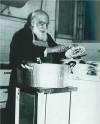 Fra' Gerardo on duty
Fra' Gerardo on duty
One night in 1944 the friars heard loud voices coming from downstairs saying
"Viva Padre Pio". The superior Padre Raffaele da S. Elia a Pianisi told the
doorkeeper Fra Gerardo da Deliceto to let those people out and lock the door
properly. Fra Gerardo went downstairs, didn't find anybody, and the door was
double locked as it was supposed to. He went back to report. Padre Raffaele was
puzzled and went straight to Padre Pio asking if he knew something.[24]
"Oh! Those were soldiers who had died on the battleground, and came to thank me
for my prayers for their salvation."[25]
And he added: “There are more souls of the dead coming up that road to
ask for my prayers than souls of the living.”[26]
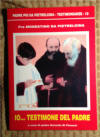 Fra' Modestino with Padre Pio
Fra' Modestino with Padre Pio
In 1945 Fra' Modestino asked Padre Pio a comparison between a fire on hearth and
the flames of Purgatory. "They compare like fresh water and boiling water."[27]
One day Padre told his doctor: "I'm praying for the good death of my great-great
grandfather". “But he died more than one hundred years ago!" replied the doctor.
Padre Pio: "Remember that for God there
is no past and no future, and everything is present. So God made use at that
time of the prayers I'm saying now."[28]
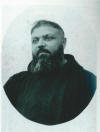 Padre Paolino da Casacalenda
Padre Paolino da Casacalenda
Padre Pio was in the common fireplace room at the convent in 1917 when he saw an
old man sitting near him. The man said: "I am Pietro Di Mauro, nicknamed
Precoco. I died on September 18, 1886, in this friary in cell #4, in a fire. The
Lord let me come to you from Purgatory. If tomorrow you say the Mass for me, I
will go to Paradise."
[29]
[30]
[31]
Padre Pio reported: "I was agitated. I told the superior Father Paolino da
Casacalenda what had happened and asked to celebrate the Mass for Pietro."
Father Paolino gave the permission and later went to consult the registry at
City Hall. In that date in 1886, when the convent had been expropriated by the
government and was a nursing home, a disabled man with that name had died in a
fire suffocated by smoke.[32]
[33]
[34]
[35]
One evening Padre Pio was praying alone in church. He heard a crash like candles
falling to the ground. He got up and went to the communion rail. There was a
young friar he had never seen before. The friar said: “I am a Capuchin novice,
and I am from Purgatory, doing penance for lack of diligence in my work in the
church.” Padre Pio said: “Tomorrow my Mass will be for you. Now go away and
never come back.” Padre Emanuele happened to pass by. He and Padre Pio went to
give a closer look. They found behind the altar many large candles on the floor,
all broken.[36]
[37]
[38]
[39]
A woman went to Padre Pio to know about her brother, who had committed suicide
after a financial difficulty. She went to his Mass but was unable to talk to
him. She sat in church, crying and praying, while Padre Pio was confessing. At a
certain moment she got a nudge and was told: “Padre Pio is calling you.” She
turned towards the confessional. Padre Pio was making a sign to her with the
hand, to approach the confessional. She did, and kneeled in front of him, and
Padre Pio said: “Don’t worry, stay calm, he is saved.”[40]
 Padre Alberto D'Apolito with Padre Pio
Padre Alberto D'Apolito with Padre Pio
Salvatore D’Apolito in 1938 returned to San Giovanni Rotondo with his daughter
Nunzia after 22 years in the United States. They visited with Padre Pio and with
Padre Alberto D’Apolito, son of Salvatore. Few months later, in February 1939
Salvatore got pneumonia and died within few hours. Padre Pio told Padre Alberto:
“Have courage, be tranquil, your father is saved.”[41]
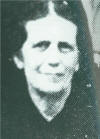 Elena Bandini
Elena Bandini
Elena Bandini had been helping for many years the church, the monastery, and the
local people of San Giovanni Rotondo. When she died, John McCaffery told Padre
Pio: “She certainly went without any stop from here to Paradise”. Padre Pio with
two great tears rolling down his cheeks: “Oh! Without stop at all!”[42]
Elena Bandini, from Borgo San Lorenzo in the province of Florence, had been very
active in the Franciscan apostolate in the Mugello area. Padre Pio wrote to her
twenty four letters. She moved permanently to San Giovanni Rotondo in 193, and
died in 1955.[43]
Padre Costantino Capobianco to Padre Pio: “I want to die before you do so you
can assist me.” Padre Pio: “Do you think I cannot come from Heaven?”[44]
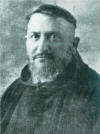 Padre Giuseppantonio
Padre Giuseppantonio
Padre Giuseppantonio da San Marco in Lamis was ill in the Foggia convent. On
December 29, 1936 Padre Pio was asked by Padre Giacinto da Sant’Elia a Pianisi
to pray for him because his health was deteriorating. That night, at about 2:00
AM on December 30, somebody knocked at Padre Pio's door. Padre Giuseppe entered
in the room. Padre Pio told him: "How are you doing? They told me that you were
gravely ill and now I see you here." Padre Giuseppantonio: "I'm well. All my
suffering has ended, and I came to thank you for your prayers." Then he
disappeared. In the morning Padre Pio told Padre Bernardo da Alpicella what had
happened. Nobody knew yet that Padre Giuseppe had died. Later they found out
that he had died at the same time that he had visited Padre Pio.[45]
[46]
[47]
[48]
In the convent of San Giovanni Rotondo one evening the friars heard music and a
choir singing. Nobody that they knew could be performing at that time of the
day. They went to Padre Pio, who was absorbed in prayer, and asked him about it.
“So, what? Why are you marveling? Those are the voices of the angel taking the
souls from Purgatory to Paradise!”[49]
A friar testified: “We were all in the dining room when Padre Pio got suddenly up and walked at steady pace to the door of the convent. He opened it and started having a conversation. The two friars that went with him didn't see anybody and started thinking that something might be wrong with Padre Pio. On the way back to the dining area Padre Pio explained. "Don't worry. I was talking to some souls on their way from Purgatory to Paradise. They came to thank me that I remembered them today in the Mass."[50]
Carmela Marocchino's brother Padre Vittore da Canosa died suddenly on January
29, 1958. Carmela asked Padre Pio why the sudden death. "Do you know what Jesus
did of your brother? Jesus went into the garden, and there were many flowers,
and one was more beautiful than the others. He leaned on the most beautiful and
picked it." Is he saved?" Yes, but we need to pray." On July 29 she asked again
if he was saved. "My daughter, we priests are more responsible in front of God.
Let's continue praying." On December 29, 1958 she asked again were her brother
was. "He is in Paradise."[51]
Nina Campanile's brother Pasqualino died in combat on September 26, 1916. Her
mom sent Nina with her teacher Vittorina Ventrella to ask Padre Pio if
Pasqualino was saved. “Yes he is saved, but he needs your prayers." She asked
again on Christmas 1918. Padre Pio said: "He is up there!"[52]
With Padre Pio, at times a grave physical illness disappeared for a period of
two or three years, sometimes longer. People called it “The two years reprieve”.
They were given time to organize their life and prepare for the final journey.[53]
Dr. Francesco Ricciardi from San Giovanni Rotondo, outspoken atheist and
supporter of attacks on Padre Pio, in the fall of 1928 was diagnosed with
advanced stomach cancer. His condition was deemed hopeless, and by December he
was near death. Padre Pio went to visit him, and spent some time alone with him.
No one knows what occurred between the two men, except that Ricciardi confessed
and received Holy Communion. When the family was readmitted in the room, Padre
Pio told the doctor: “Your soul is healed, and soon your body will be healed as
well.” Within three days all signs of cancer had disappeared. Dr. Ricciardi
lived nearly four more years, and died a practicing catholic.[54]
[55]
[56]
Playwright Luigi Antonelli had cancer of the face, neck, and jaw. The doctors
told him that he would die within three months. He confessed to Padre Pio. Back
home he refused surgery, felt “miraculously cured”, and worked intensely on
several literary projects until his death, three years later.[57]
[58]
Giuseppe Scatigna of Palermo was being treated at Casa Sollievo in 1968, just
before the death of Padre Pio. He had terminal cancer with metastatic
lymph-glandular melano-sarcoma. The cancer was so advanced that he was told that
he was unlikely to live for more than 48 hours. The wife got from the friars a
piece of a linen clot that had been used by Padre Pio on his side wound. The two
of them prayed that he might have five more years of life so that he might help
grow the adopted daughter. He had a dream of Padre Pio trying to lift an
enormous stone while young people stood around laughing at him. He felt
immediately better. The morning after the doctor making round asked him how he
was feeling. He said: I feel perfectly well.” He looked normal to the doctor.
All the analyses and tests performed were negative. X rays revealed no trace of
cancer. He was discharged, completely healed. It was November 23, 1968, thirty
days after Padre Pio’s death. He went back to Sicily and was in good health for
almost ten years. Before he died he said: “I wanted five years so that our
daughter could grow up. Padre Pio obtained nine. So I am grateful.” He died a
happy death.[59]
John and Elle Lynch lived in Canterbury, England. In 1981 they were expected to
die in a matter of days. John had
terminal congestive heart failure, and Ellen had advanced pancreatic cancer.
Padre Pio appeared to John and both husband and wife recovered almost
instantaneously. The doctors were amazed and begun to doubt their diagnoses, but
they had documentation of the tests done for John, and the exploratory surgery
for Ellen. For next two years they lived extremely well and united to the Roman
Catholic Church. Than the original diseases recurred, and they died grateful
that they had been given time to sort out their lives.[60]
Padre Marcellino Iasenzaniro was chaplain at a hospital in Milan. He used to
bring Communion to a hospitalized man who was told by the doctor that he had
terminal throat cancer and they needed to operate. The man left the hospital and
went to Padre Pio for advice. He had been to Padre Pio in the past, but Padre
Pio he had been harsh with him. This time Padre Pio said: “You must not have the
operation. You must not be touched.” The man lived eight years more. He used to
say: “I have received two miracles from Padre Pio. The second one is that I have
lived for more years, but the first miracle that I received from him was my
conversion.”[61]
In November 1972 a man in Rome was suffering day and night from terminal cancer.
One day, with various family members around him, he began to shout: “Sent that
friar away. Don’t you see him? He is a Capuchin friar with a white beard. He is
telling me to go with him. I do not want to go. He told me that he will come for
me on then fifth of February. He is leaving now.” The family members thought
that the illness and the medications had made him to hallucinate. But he soon
recovered. He recognized in a picture of Padre Pio the friar that he had seen.
He went to church every day and spent all his time praying. At the beginning of
February 1973 he had a relapse and on the 5th he died serenely, with
the name of Jesus on his lips.[62]
Brian John, a young child from Liverpool, was dying of leukemia. The parents
were non practicing members of the Church of England. They wanted to pray and
asked a Roman Catholic friend for help. “Pray to Padre Pio.” “Who is Padre Pio?”
“Just pray.” They prayed to Padre Pio about whom they knew nothing. Two weeks
later Brian asked his mom: “Did you see the man who came to see me last night?”
Brian was visited for several nights. He told his parents: “He said that his
name is Padre Pio. He has a long brown dress on, and he has holes in his hands
and feet. Those holes don’t hurt him anymore.” When Brian was talking, his
parents smelled a wonderful fragrance that permeated the entire house. One
evening the child told his mom: “You have to ask God for another little boy.
Padre Pio has told me that he is coming very soon to take me to my Lady.” Few
days later the child deteriorated and was taken to the hospital, where he died
peacefully.[63]
 Dr. Karl Kisvarday
Dr. Karl Kisvarday
Dr. Karl Kisvarday, administrator of Casa Sollievo reported that Padre Pio told
him: “Carletto, the Lord has already established the date or our death, but I’m
saying a special prayer to add one more year to the time allotted to you.” One
day in 1959 Dr. Kisvarday was brought in
a coma in the intensive care ward. He remained unconscious for three days,
assisted by his housekeeper Paola Novak. One night Paola had gone home
exhausted. At the doctor’s bedside were the nurse Margherita and a young nun.
The nurse and the nun stepped out of the room for less than a minute. On their
way back they saw a monk leaving the room and walk away. They went in together.
All at once the patient exclaimed: “Oh., what a beautiful perfume!” “It’s the
alcohol, doctor” said Margherita, who was preparing the hypodermic for an
injection. “No, no, it’s the perfume of Padre Pio. He came. We talked. And he
left.” A little less than a year after this, Dr. Kisvarday died. But he had his
extra year of perfect health.[64]
Hell
 John McCaffery wrote the book "Tales of Padre Pio"
John McCaffery wrote the book "Tales of Padre Pio"
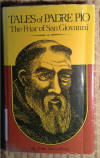
To John McCaffery: "I believe that not a great number of souls go to hell. God
loves us so much. He formed us at his image. God loves us beyond understanding.
And it is my belief that when we have passed from the consciousness of the
world, when we appear to be dead, God, before He judges us, will give us a
chance to see and understand what sin really is. And if we understand it
properly, how could we fail to repent?"[65]
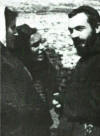 Cleonice Morcaldi wrote the book "My life near Padre Pio"
Cleonice Morcaldi wrote the book "My life near Padre Pio"

To Cleonice Morcaldi: “I have been down to Hell with those miserable, and God
made me experience the sufferings of the damned.”[66]
 Padre Pio's Guardian angel. Mosaic in St. Pio's crypt
Padre Pio's Guardian angel. Mosaic in St. Pio's crypt
Padre Ludovico testified: “When he speaks, it seems that besides the person to
whom he is speaking, there might be another one whom he might be addressing. It
is commonly said that he speaks with his guardian angel.”[67]
Padre Pio called the guardian angel: “The companion of my infancy.”[68]
“The little companion of my infancy.”
[69]
To Raffaelina Cerase: “Oh! What a consolation is to be under the protection of a
celestial being who never leaves us, not even when we are disgusting God!”[70]
“Take on the good habit of always thinking about him.”[71]
“This celestial spirit never leaves us alone, from cradle to grave.”[72]
“He guides and protects us, especially in sad times.”[73]
“Oh! If people could appreciate this great gift from God!”[74]
“At the moment of death, the soul will see this sweet companion.”[75]
To Cleonice Morcaldi: "The Angels are jealous of us because they can't suffer
for God."[76]
“The Guardian angel never lives us. He guides us; he gives us good inspirations
and protects us from the enemies.”[77]
To a person badly suffering for a life event: “Your tears have been collected by
the angels in a golden cup. You will find them when present yourself to God.”[78]
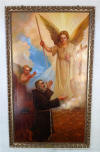 Painting
in Mary Pyle's home
Painting
in Mary Pyle's home
 Mosaic in St. Mary of the graces.
Mosaic in St. Mary of the graces.
“Send me your guardian angel”.[79]
[80]
“If you can’t reach me, send me your guardian angel to bring your message to me.
I will help you for what I can”
[81]
“You may send me your guardian angel at any time, day or night, and I will be
always happy to receive him.”[82]
Cecil Humphrey-Smith told Padre Pio that back home he would write to him. Padre
Pio: “Son, what do I want with more letters? I get so many already. Send me you
Guardian Angel instead.”[83]
In 1912 Padre Agostino on a trip passed by Pio’s house in Pietrelcina at three
in the morning. At that time Padre Pio was living there. Padre Agostino marveled
that the door was open. So he decided to get in. Padre Pio was in bed but not
asleep. “Why do you leave the door unlocked?” “I am not scared. I have the
guardian angels keeping watch through the night.”[84]
December 13, 1912 to Padre Agostino: “Your letter could be read with the help of
the little angel. He had suggested me to sprinkle your letters with holy water
before I opened them. That’s what I did with your most recent letter.”[85]
Barbara Ward was about to have
surgery for multiple ovarian cysts, in St. George’s Hospital in London. Bernardo
Patrizi left the hospital to go to the post office, from where he sent a
telegram to Padre Pio: “Barbara sick. Urgently requires your prayers.” When he
returned to the Hospital the receptionist asked him to take to Barbara the
flowers and the telegram that had just arrived. The telegram said: “Sorry to
hear of your illness. Be assured of my prayers.” Next time that Bernardo was in
San Giovanni Rotondo he told Padre Pio that Barbara had recovered and thanked
him for the flowers and telegram. Padre Pio: “Huh! Telegrams! Guardian Angels
are quicker, and cheaper.”[86]
One afternoon Padre Alessio was sitting with Padre Pio on the veranda. Padre
Alessio started asking something. Padre Pio interrupted him: “Boy, don’t you see
that I am busy? Later: “Didn’t you see all those guardian angels going back and
forth to my spiritual children, bringing me their messages?”
[87]
Padre Alessio, sitting with Padre Pio while he was praying the rosary heard
“very often” Padre Pio saying things that seemed unrelated to the rosary, such
as: “Tell her that I will pray for her.” “Tell him that I will knock at the
Heart of Jesus to implore that grace.” “Tell him that he will be present to my
mass.” “Tell her that the Virgin will not refuse this grace.” Padre Alessio
wrote that only years later he understood what had been going on between Padre
Pio and the angels.[88]
Padre Alessio Parente was Padre Pio’s assistant in 1959-1961, and in 1965-8.[89]

Padre Paolino da Casacalenda told Padre Pio that if he needed help at night he
could send his guardian angel. One night he woke up like he had been shaken
vigorously. He felt completely awake. He remembered about Padre Pio and run to
his cell, asking if he needed something. Padre Pio: “Yes. I am dripping with
sweat, and I need to change. I can’t do it by myself. Please help me.”[90]
Padre Alessio and another priest were distributing the Communion to a very large
number of faithful. Padre Alessio's pix emptied sooner and he went back to the
altar for the purification of the pix. He had just completed the rite when,
looking at his immediate right he saw a host standing in midair. The Host moved
towards the pix and fell into the pix with an audible click sound. Padre Alessio
was devastated by what he had seen. He hadn't seen anybody holding the Host.
Later in the day Padre Alessio reported his experience to Padre Pio. Padre Pio:
"Boy, be more careful and do not distribute the communion too fast. Tank your
guardian Angel for not letting the Host fall to the ground."[91]
Cecil Humphrey-Smith reported major lesions in a car accident in 1955. His
friend Marquis Sacchetti after visiting him in the hospital decided to go to the
post office to send a telegram to Padre Pio asking for prayers. Both of them
were spiritual children. At the
post office Marquis Sacchetti filled the form for the telegram and gave it to
the postal employee. The postman read the names of the sender and of the
addressed, than gave him a telegram that had just arrived. It was from Padre
Pio, promising prayers for a prompt and complete recovery. Sometime later, they
went to Padre Pio to thank him for his prayers. They did, and when they told him
of the coincidence of the telegrams Padre Pio said: "Do you think that the
angels are slow as the airplanes?"[92]
[93]
[94]
Padre Mariano Paladino stayed many years at the convent. From 1950 to1960, and
from 1965 to1969. He was the first chaplain of the Home for the Relief of
Suffering. He wrote an unpublished manuscript of Memories, recalling his years
with Padre Pio.
One day while he was in Lourdes he prayed his guardian angel to go to Padre Pio
and ask him to pray for a special grace. After a little while he smelled the
intense perfume of Padre Pio. Back in the convent, Padre Pio told him: "The
angel came right away. He is not disobedient like me and you.
And the perfume meant that I love you."[95]
Margherita Cassano in 1947 was living in one little room at the beginning of
Viale Cappuccini, quite distant from the convent. In those days there was no
illumination of the street, and the road unsafe, full of stones. She got up
every morning at three to get in the church on time for Padre Pio’s mass. She
reported than several times, in the pitch dark, walking towards the convent she
heard a male voice going: “One, two, one two.” She was terrorized. And again:
“One, two, one two.” She finally reached the church. When she had a chance she
told Padre Pio that she was going mad. Padre Pio: “It’s your angel counting your
footsteps to keep you company. It is just to let you know he is there, watching
over you on your way.”[96]
[97]
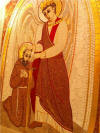 Padre Pio protected by the Archangel Michael. Mosaic in
St. Pio's crypt.
Padre Pio protected by the Archangel Michael. Mosaic in
St. Pio's crypt.
Piergiorgio Biavati was driving from Florence to San Giovanni Rotondo in 1960.
When he reached Napoli he felt very tired and sleepy. He stopped at a rest area
for coffee. There were three more hours of driving. He testified: “I remember
only that I started the engine and put my hands on the wheel. I don’t remember
any second of the drive. When I reached the square in front of the friary
someone shook me by the shoulders and said: “Come on now, take over.” When
Biavati told Padre Pio of the episode, Padre Pio said: “You were right. You were
sleeping all the way and my guardian angel was driving for you.”[98]
[99]
One night a group of spiritual children had just arrived to San Giovanni
Rotondo. It was late, and they started discussing what they would ask Padre Pio
the day after, and prayed their guardian angels to tell him as soon as possible.
The day after, Padre Pio: “Naughty kids, you don’t leave me alone, not even at
night.”[100]
An attorney from Fano was driving back home to Bologna with wife and children.
During the trip he fell asleep at the wheel. He woke up few miles from home. He
said "Who drove my car?" The wife said: "You were still, and didn't answer to
us, and you avoided several collisions at last second. Your driving was
different from usual." Two months later he visited Padre Pio, who told him from
afar: "You were asleep and the Guardian Angel drove your car." The mystery was
solved.
[101]
Padre Lino Barbati sent his Guardian Angel to ask Padre Pio for the healing of a
person. That person was not getting better. He asked Padre Pio: “Could it be
that at times the Guardian Angel doesn't do what we ask him to do?” Padre Pio:
"What? Are you thinking that he is disobedient like me and you?"[102]

On September 7, 1912 Padre Agostino wrote a letter to Padre Pio in Greek.[103]
He knew that Padre Pio didn’t know Greek.
Don Salvatore Pannullo was present when Padre Pio opened the letter. At the
bottom of the letter he later wrote this testimony: “Under the sanctity of
oath, I testify that Padre Pio opened this letter and explained to me word by
word the content. I asked him how could he read and explain the content without
even knowing the Greek alphabet, he answered: “You know! The Guardian Angel
explained me everything.”[104]
Padre Agostino wrote in his diary :”Padre Pio didn’t know Greek or French. It
was his guardian angel who explained things to him, and he answered to the
point.[105]
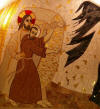 Padre Pio fighting the devil.
Mosaic in St. Pio's crypt.
Padre Pio fighting the devil.
Mosaic in St. Pio's crypt.
August 17, 1910 to Padre Benedetto: “The devil tries me by frequent temptations
against holy purity which he arouses in my imagination.”[106]
October 22, 1910: “Temptations are more than ever greatly distressing me,
because of their ugliness. There are moments were I am on the brink of the
precipice.”[107]
December 20, 1910: “I am in the hands of the devil. He tries to snatch me from
the arms of Jesus.”[108]
January 10, 1911: “The devil has waged war against me more than ever. The devil
wants me for him at any price.”[109]
April 9, 1911: “The enemy is making every effort to introduce into my mind
impure thoughts and ideas of despair.”[110]
January 18, 1912: “It has been for several days that Barbablu’ comes with his
satellites, in their own form of devils, and they beat me with clubs and iron
devices, throwing me out of bed and dragging me around the room.[111]
End of January, 1912: “Barbablu’, with many of his peers, doesn’t stop beating
me almost to death.”[112]
“Never has the devil found such fertile territory as in this era when his very
existence is denied by so many.”[113]
“The enemy plays strong with the weak, but he is a coward when is faced
with the weapon in hand.”[114]
"The devil is like a rabid dog tied to a chain; beyond the length of the
chain he cannot seize anyone. And you: keep at a distance.
If you approach too near, you let yourself be caught."[115]
[116]
[117]
“Satan is like a chained dog. He cannot go farther than the chain. But if
you go near him he will bit you.”[118]
"The human soul is the battlefield between God and Satan."[119]
“If all the devils would take bodily form they would blot out the light of the
sun."[120]
[121]
"The devil enters a soul only through one door: our will power. There are no
secret doors."[122]
[123]
"If the devil is making uproar, it is an excellent sign:
what is terrifying is his peace and concord with a man’s soul.”[124]
“Evil is not won by doing evil, but by doing good, that has supernatural
strength.”[125]

"The thought doesn't make the sin, but consenting to the thoughts does it."[126]
"Temptation is like the soap. It seems to soil but in reality cleans."[127]
"Temptations against faith and purity are the merchandise offered by the enemy."[128]
"When the enemy roars around you, it shows that he is not inside you."[129]
[130]
“For only one deliberate sin of thought was the great angel Lucifer cast out of
heaven.”[131]
December 13, 1912 to Padre Agostino: “The other night a friar came in and told
me that by order of the Provincial Father I was not allowed to write anymore to
you. I cried bitterly. I believed it. The angel had hard time to convince me
that it was all a deception, a trick of barbablu.”[132]
Padre Emilio da Matrice reported that in 1917 he was one of the about sixteen
students at the seraphic college in the convent of San Giovanni Rotondo. Padre
Pio was the spiritual director, and slept in the dormitory, in a corner bed
hidden by curtains. The curtains were held by sturdy iron bars planted in the
wall, and one strong upright bar. “One night we all heard iron bars banging and
echoing, and producing frightening sounds. We were paralyzed and hid under the
blankets. In the morning the bars were on the floor twisted and bent in a
terrifying manner. Only a giant could have done that. We asked Padre Pio what
had happened. He said: “Let’s go to the choir and pray because our dear Lord is
so good. “ Few days later Padre Pio told us that the devil had beaten him and
twisted the bars, because he was praying for one of us student friars going
through a temptation against purity.”[133]
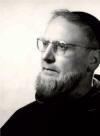 Padre Alberto D'Apolito
Padre Alberto D'Apolito
Padre Alberto D’Apolito was a student at the seraphic college in 1921 and
remembers Padre Pio promising the students they would no longer hear infernal
noises during the night. One of the students said: “Padre Pio , I am not afraid
of the devil; send him to me and I will fight him.” Padre Pio answered: “You
don’t know what you are saying. If you saw the devil you would die of scare.”[134]
August 9, 1912, in a letter to Padre Agostino: 'Barbablu' prevents me from
writing to you. Every time I try, I get a terrible headache, and the right arm
is paralyzed and I can't hold the pen in my hand."[135]
December 3, 1912, in a letter to Padre Agostino: "I received you letter on
November 29. It was opened when the archpriest was with me. What did we find?
Just a blank piece of paper. If I didn’t know the strange war of the 'cosaccio',
I would ask you if there was any mistake on your side.”[136]
[137]
[138]
The blank letter has not been
preserved but was seen by Padre Agostino, as he wrote in his diary.[139]
On November 6, 1912, Padre Agostino sent a letter to Padre Pio on two sides,
written in French. The letter was all stained, and couldn’t be read. The
archpriest Salvatore Pannullo wrote on August 5, 1919, in a sworn testimony: “I
was present when this letter was opened. It was so stained that it couldn’t be
read at all. A Crucifix was put on
the letter; it was also sprinkled with holy water and the exorcisms were
recited. Afterwards the letter could be read the way it is now. I called my
niece Grazia Pannullo and she read the letter to me and to Padre Pio. She didn’t
know what we had done before calling her.”[140]
While in Sant’Elia a Pianisi Brother Pio saw the devil coming in his cell. He
reported in a letter: “He was in the form of an enormous dog, with a lot of
smoke coming out of his mouth, and the dog talked and said: ‘It’s him, it’s
him.’ He had a strong smell of sulphur. The horrible animal leaped out of the
window, jumped on the roof of the nearby building, and disappeared.”[141]
[142]
In Gesualdo, in 1909, the devil appeared to Padre Pio in the form of Padre
Agostino and tried to discourage him from continuing the religious life. Padre
Pio was disconcerted, and at the moment he started to understand he said:
“Whoever you are repeat after me ‘Long live Jesus’. The visitor disappeared in a
cloud of smoke living behind a disgusting stench.[143]
[144]
In Venafro, in 1911, from Padre Agostino's diary: “Starting in November 1911, I
was present with Padre Evangelista, the superior of the monastery, for a
considerable number of ecstasies, and many instances of demonic oppression."[145]
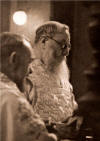
Padre Agostino: "Satan would appear as a nude woman dancing lewdly, as is
spiritual father, as his superior, pope Pius X, his guardian angel, St. Francis,
the Virgin Mary, and also as the horrible self, with an army of demonic spirits.
At times there were no apparitions but he was beaten until he bled, tormented
with deafening noises, covered with spit. He was able to free himself from the
torments by calling on the name of Jesus."[146]
Padre Pio in a letter to Padre Agostino on January 18, 1913:”It was late at
night, and the devils assaulted me with a terrible fracas, and jumped on me, and
threw me to the floor, and beat me very hard, and scattered pillows, books,
chairs, while pronouncing very dirty words.”[147]
Padre Paolino da Casacalenda reported that, while in Foggia, Padre Pio usually
did not join the friars for dinner. One evening the friars heard a terrible
noise coming from Padre Pio’s room. They run to him and found him beaten and
prostrated. He was sweating so profusely that the undershirt looked like it had
just been removed from a basin full of water.
[148]
Padre Paolino reported that when Padre Pio was in the convent of Foggia, one
evening Mons. Andrea D’Agostino, Bishop of Ariano Irpino was staying overnight
at the friary. After dinner with the friars he heard “an infernal fracas” coming
from Padre Pio’s room. He was so scared that left the convent on the spot.[149]
Padre Pio told Padre Tarcisio da Cervinara: “One morning a well-dressed polite
man came to confess. He enumerated the most horrible, disgusting, abominable
sins. He justified every one of them with subtle argumentations. I thought: “Who
is this? Where does he come from?” I was very perplexed until a vivid interior
light made me understand who was in front of me. At that point I said firmly:
“Say long live Jesus.” As soon as I said those words satan disappeared in a
flicker of fire, leaving after him an unsupportable stench.”[150]
On the late evening of Sunday July 5, 1964 Padre Pio was in his room when he
cried: “My brothers help me.” When the friars came they found Padre Pio lying on
the floor bleeding from the nose and the forehead, and with a number of wounds
above his right eyebrow. He had been badly beaten by the devils.[151]
[152]
[153]
[154]
Bill Martin: “We had to call the doctor in at ten o’ clock that night to put
stitches in the wound. It was so deep he couldn’t open his eyes.” Padre Pio:
“The devils tried to scratch my eyes out.”[155]
Padre Paolino da Casacalenda was about to leave Padre Pio's cell, in the Foggia
convent, after a conversation with him. Padre Pio asked: "Don't leave; otherwise
the devils (cosacci) will come." He stayed a little longer and then left. But
just a few steps away he heard a terrible noise, and run back. Padre Pio had
been assaulted. He was pale and sweating profusely.[156]
One evening Padre Pio called several times Padre Alessio to go to his cell.
“Every time that I went to his room he would just smile.” Padre Alessio asked
why he was calling him so many times without needing anything. Padre Pio finally
said: “Please, son, sit there in the easy chair and stay here with me, because
as soon as I am by myself the devils don’t leave me alone for a second.”[157]
In 1946 a woman from Bottegone had pains and swelling in the knees and legs, and
abdominal swelling. The doctors could offer no remedy. She went to Padre Pio for
help. When she was at the confessional her body started to swell and she began
yelling and screaming. Padre Pio went up to her and kicked her saying: “Go!
Satan!” The woman fainted. When she recovered she realized that she was healthy
and had been delivered from the devil.[158]
A boy in Milan was perfectly normal. Suddenly at age six he stopped speaking.
Any kind of therapies was unsuccessful. At age twelve he was brought to Padre
Pio. Padre Pio said:” This is not a thing for medicine.” He made the sign of the
cross over the boy, and the boy immediately began to speak.[159]
Maria Palma Carboni a fifteen years old girl was victim of frightening severe
diabolic possessions. No blessings could deliver her from the terrifying
torment. On June 19, 1952, she was brought to Padre Pio who rested his hands
upon her head. At the contact the girl fell into a swoon. After few minutes she
revived, free of diabolic possession.[160]
Agostino, d. S. (2012). Diario. San
Giovanni Rotondo: Edizioni Padre Pio.
Alberto, D. P. (2007). Padre Pio of
Pietrelcina. Memories. Experiences. Testimonials. San Giovanni Rotondo:
Edizioni Padre Pio.
Alessando, da Ripabottoni (Saint Pio of
Pietrelcina. Everybody's Cyrenean). 2010. San Giovanni Rotondo: Edizioni
Padre Pio. Ale10
Capobianco, C. P. (2006). Words and anecdots
of Padre Pio. San Giovanni Rotondo: Edizioni Padre Pio. Cap12
Castelli, F. (2011). Padre Pio under
investigation. The secret Vatican files. San Francisco: Ignatius Press.
Cas11
Cataneo, P. (1991). Padre Pio gleanings.
Editions Paulines Quebec. Cat91
Cervinara, Padre Tarcisio da (1993). Il
diavolo nella vita di Padre Pio. San Giovanni Rotondo: Edizioni Padre Pio.
Tar93
Clarice, B. (1970). Roads to Padre Pio.
Roma: Citta' Nuova. Bru70
Convento. (2001). Padre Pio dalla Terra al
Cielo. San Giovanni Rotondo: Edizioni Frati Cappuccini. Con10
Covino, P. P. (2007). Ricordi e
testimonianze. San Giovanni Rotondo: Edizioni Padre Pio. Cov07
Duchess Suzanne, o. S. (1983). Magic of a
Mistic. Stories of Padre Pio. New York: Clarkson N. Potter. Duc83
Gallagher, J. (1995). Padre Pio, The pierced
priest. London: HarperCollins. Gal95
Iasenzaniro, M. (2007). Charismatic piest.
Testimonies. San Giovanni Rotondo: Edizioni Padre Pio. Ias07
Malatesta, E. (1997). L'Ultimo segreto di
Padre Pio. Casale Monferrato: Edizioni Piemme. Mal97
McCaffery, J. (1978). Tales of Padre Pio.
Kansas City: Andrews and McMeel. McC78
Morcaldi, C. (1997). LA MIA VITA VICINO A
PADRE PIO Diario intimo spirituale. Roma: Edizioni Dehoniane. Cle97
Mortimer Carty, f. C. (1973). Padre Pio the
stigmatist. TAN Books. Mor73
Multiple. (2009). Padre Pio The wonder
worker. New Bedord, MA: Franciscan Friars of Immaculate. Mul09
Napolitano, F. (1978). Padre Pio of
Pietrelcina. A brief biography. San Giovanni Rotondo: Edizioni Padre Pio.
Nap78
Padre, Pio da Pietrelcina (2010). Have a good
day. San Giovanni Rotondo: Edizioni Padre Pio. Pio10
Parente, A. (1994). The Holy Souls. Viva
Padre Pio. San Giovanni Rotondo: Edizioni Padre Pio. Par94
Parente, A. (2011). Padre Pio e le anime del
purgatorio. San Giovanni Rotondo: Edizioni Padre Pio. Par011
Pietrelcina, P. P. (2011). Epistolario I
Corrispondenza con i direttori spirituali (1910-1922). San Giovanni Rotondo:
Edizioni Padre Pio. Epist. I
Pietrelcina, P. P. (2011). Epistolario II,
corrispondenza con la nobildonna Raffaelina Cerase (1914-5). San Giovanni
Rotondo: Edizioni Padre Pio. Epist. II
Pietrelcina, P. P. (2012). Epistolario III,
corrispondenza con le figlie spirituali (1915-1923). San Giovanni Rotondo:
Edizioni Padre Pio. Epist. III
Preziuso, G. (2000). The life of Padre Pio
between the altar and the confessional. New York: Alba House. Pre00
Ruffin, C. B. (1991). Padre Pio: the true
story. Huntington, Indiana: Our Sunday Visitor, Inc. Ruf91
Schug, J. O. (1987). A Padre Pio Profile.
Petersham, MA: St. Bede's Publications. Sch87
Spacucci, F. (1971). L'Ecce Homo del Gargano.
Napoli. Spa71
Winowska, M. (1988). Il vero volto di Padre
Pio. Milano: Edizioni San Paolo. Win88
[1] Cle97, 180
[2] Cle97, 181
[3] Cas11, 180
[4] Cov07, 193-4
[5] Par01, 259
[6] Par011, 108-9
[7] Par011, 109-10
[8] Par011, 110
[9] Par011, 110-1
[10] Epist. I, 206
[11] Scg87, 77
[12] Mul09, 173
[13] Par011, 209
[14] Con01, 165
[15] Cov07, 65
[16] Par011, 264-5
[17] Cap06, 224
[18] Par011, 110
[19] Par011, 129
[20] Par011, 231
[21] Par011, 169-72
[22] Par011, 159-61
[23] Par011, 165-7
[24] Cap12, 296
[25] Par011, 56
[26] Duc83, 75
[27] Par011, 95-6
[28] Par011, 103-4
[29] Mul09, 172
[30] Con01, 162
[31] Par011, 129-34
[32] Cap12, 294-6
[33] Cat91, 149-51
[34] Alb07, 88-90
[35] Ale10, 256-7
[36] Sch87, 103-4
[37] Cat91, 151
[38] Par01, 143-9
[39] Cov07, 41-2
[40] Win88, 197-9
[41] Alb07, 105-7
[42] McC78, 74-6
[43] Epist. III, 1047-74
[44] Cap06, 206-7
[45] Ruf91,, 241-2
[46] Par011, 177-9
[48] Ago12, 132 note
[49] Par94, 56
[50] Mul09, 172
[51] Par011, 156-8
[52] Par011, 151-6
[53] Ruf91, 340
[54] Cat91, 126
[55] Nap76, 142-4
[56] Ruf91, 224-5
[57] Cat91, 135-6
[58] Ruf91, 242-3
[59] Sch87, 7-13
[60] Ruf91, 341-2
[61] Ias07, 146-7
[62] Ruf91, 380
[63] Ruf91, 380-1
[64] Duc83, 120-1
[65] McC78, 67
[66] Cle97, 181
[67] Cas11, 191
[68] Epist. I, 321
[69] Epist. I, 308
[70] Epist. II, 403
[71] Epist. II, 404
[72] Epist. II, 404
[73] Epist. II, 404
[74] Epist. II , 404
[75] Epist. II , 404
[76] Pio10, 57
[77] Cle88, 190
[78] Spa71, 28
[79] Ale11, 111
[80] Par011, 30
[81] Ale11, 111-2
[82] Ale11, 156
[83] Gal95, 164
[84] Ago12, 292
[85] Epist. I, 321
[86] Gal95, 165
[87] Ale11, 113-4
[88] Ale11, 114-6
[89] Ale11, 120
[90] Pao78 100-4
[91] Ale11, 108-110
[92] Ale11, 143-4
[93] Gal95, 155-66
[94] Ruf91, 314
[95] Ale11, 149-50
[96] Duc83, 117-8
[97] Mal97, 198-9
[98] Ale11, 195-6
[99] Ruf91, 314-5
[100] Win88, 107-8
[101] Bru70, 148
[102] Ale11, 145-6
[103] Epist. I, 302
[104] Epist. I, 302
[105] Ago12, 288
[106] Epist. I, 196
[107] Epist. I,202-3
[108] Epist. I, 209
[109] Epist. I, 212-3
[110] Epist. I, 219
[111] Epist. I, 252
[112] Epist. I, 255
[113] Bru70, 150
[114] Epist. II, 77
[115] Bru70, 157
[116] Del50, 562
[117] DeL62, 45
[118] Iase06, 120
[119] Pio10,99
[120] Ing78, 116
[121] Cle97, 35
[122] Del50, 549
[123] Del62, 45
[124] Bru70, 157
[125] Cle17,37
[126] Pio10, 65
[127] Pio10, 76
[128] Pio10, 67
[129] Bru70, 157
[130] Pio10, 68
[131] Bru70, 144
[132] Epist. I, 321
[133] Bru70, 151-3
[134] Alb07, 79
[135] Epist. I, 297
[136] Epist. I, 317-8
[137] Cat91, 168-9
[138] Del62, 44
[139] Epist. I, Note 318
[140] Epist. I, Note 314
[141] Pre00, 54-5
[142] Cat91, 163-5
[143] Ale11, 72
[144] Cat91, 165-6
[145] Ago12, 275
[146] Ago12, 51
[147] Epist. I, 330
[148] Cat91, 166-7
[149] Pao78, 54-57
[150] Tar93, 47-8
[151] Sch87, 72-3
[152] Ing78, 114-5
[153] Cat91, 170-2
[154] Alb07, 80-4
[155] Duc68, 8
[156] Con01, 144
[157] Ale11, 73-4
[158] Cat91, 172
[159] Sch87, 75
[160] Mor73, 2257